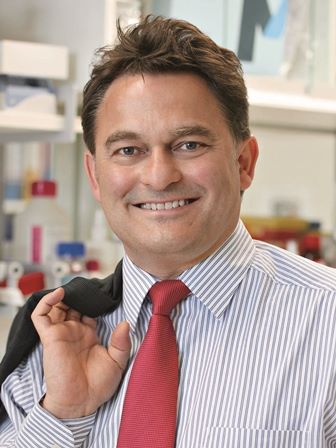Here you can find detailed profiles of DKTK faculty members with programm specification and research focus in the Researcher Database. Find contacts of all DKTK scientists at the DKTK intranet
Researcher Database

Prof. Dr. Andreas Trumpp
Division of Stem Cells and Cancer
Im Neuenheimer Feld 280
69120 Heidelberg
Program
Exploitation of Oncogenic Mechanisms (EOM)
Summary
Identification and Targeting of Cancer- and Metastasis Stem Cells
Over the last 15 years the Trumpp team has contributed to a better understanding of the molecular and cellular basis of normal and malignant (AML, MDS, breast and pancreatic cancer) stem cell self-renewal and differentiation as well as the role of MYC in stem cells and cancer.
The group demonstrated that the most potent hematopoietic stem cells (HSC) or pluripotent stem cells can exist in a state of MYC mediated deep dormancy during homeostasis to preserve their genomic integrity (Cell 2008, Cell 2016). However, bacterial/viral infections or chemotherapy activates dormant HSCs to quickly restore functionality (Nature 2009 and 2015, Cell Stem Cell 2014, Cell 2017). Recently, single cell analyses of the human hematopoietic system reveals a cellular continuum downstream of HSCs without discrete progenitor stages (Nature Cell Biology, 2017). The group runs an Acute Myeloid Leukemia (AML) program analyzing leukemic stem cells (LSC) by multi-omics analysis and identified a novel signaling node linking metabolism to epigenetic control of the LSC epigenome.
Breast Cancer: We have developed methods to isolate blood circulating “metastasis initiating cells” (MICs) directly from the peripheral blood of breast cancer patients. High numbers of these MICs in the blood or in the primary tumor of patients correlated with very poor overall survival and these receptors now offer novel possibilities for the design of better diagnostic and therapeutic tools for metastatic breast cancer (Nature Biotech. 2013).
Pancreatic Cancer: We have recently uncovered three novel subclasses of human pancreatic cancer and have developed biomarkers to identify them. We then identified a novel CYP3A5 mediated mechanism used by tumors to display primary and develop secondary resistance against paclitaxel and tyrosine-kinase inhibitors (Nature Medicine 2016). Next generation sequencing and molecular multi-omics characterization of subtype specific cancer and metastasis stem cells will provide the basis for the generation of novel diagnostic and therapeutic tools to target advanced therapy resistant cancers, including metastasis.